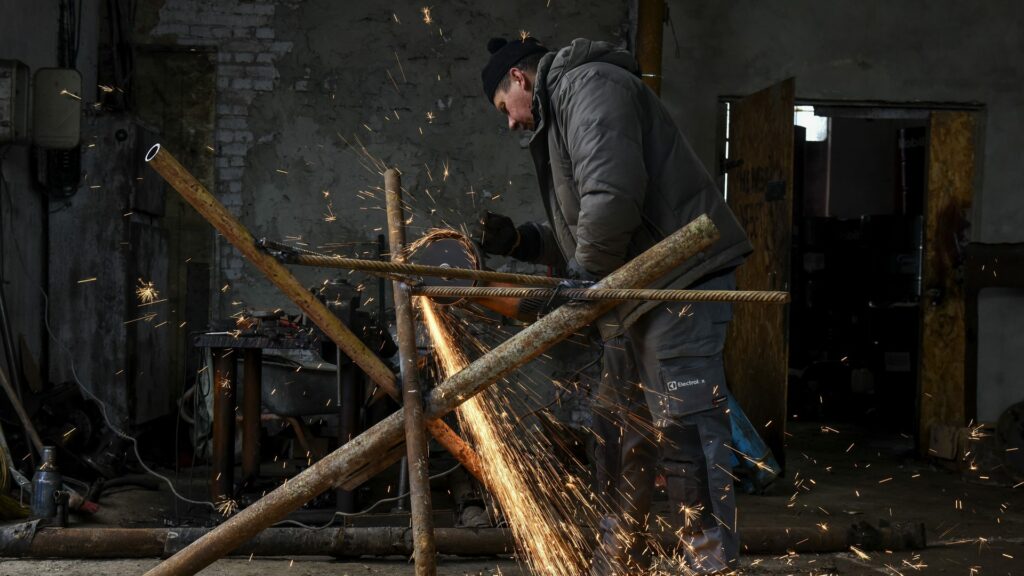“All Ukrainians appreciated the offer from Mr Dendias. It is a good gesture. It will be interesting to see what the Russians will do,” said Mr Savidi, the deputy-president of the Greek community organisation Enotita that was based in Kyiv. Mr Savidi is now in Ivano-Frankivsk in western Ukraine.
The fact that the Greek Consul-General to Mariupol, Manolis Androulakis, was the last diplomat to leave the besieged port city in south-eastern Ukraine was also noted by the people of Ukraine.
“Even the Red Cross left the city before the Greek Consul-General. Everyone left before him,” Mr Savidi said and added that volunteers from many countries had come to fight against the Russians including from US Canada, Britain, Sweden, the Netherlands and even from Chile and Brazil.
He said the intense resistance that the defenders of Mariupol had put up had proved costly for the Russians who had hoped to take the city quickly and then march on to take their main objective, Odessa.
“The Russians committed two elite battalions to Mariupol, many of them have been killed in the fighting including a general and battalion commander,” Mr Savidi said.
But even as he drew pride from the bravery and tenacity of the city defenders, he also felt pain for the tragedy that confronted the civilian population caught in the fighting.
He spoke of a Kyiv friend who was desperately trying to get news of her mother who as far she knew was trapped in Mariupol.
“She has no information about her mum, but she has heard that her father was killed when he stepped on a mine on a city beach. The sea around Mariupol is not deep and he may have been trying to escape that way,” Mr Savidi said.
“There is the story of a mother who was looking to escape the city with her young child and she picked up three children who lost their parents in the fighting. She was able to bring them out of the city and they are now safe in Hungary. We are hearing lots of stories here from friends and friends of friends about what is happening there.”
“We do not know all the statistics about how many are dead on each side but it is many thousands. The Russians have already lost more soldiers in the Ukraine than they did in 10 years of war in Afghanistan. It is a very brutal war, whole cities are being destroyed and it is hard to know what it is doing to the civillians trapped in the fighting.”
Contrary to an earlier report in Neos Kosmos, Mr Savidi fled Kyiv in the first week of the Russian invasion in a car with his wife, Anastasia, who was five months’ pregnant, as well as a family friend, his wife and their young child.
The couple are now living in relative safety with relatives in Ivano Frankivsk a town 130km south of Lviv in western Ukraine and about the same distance to the southern borders of Romania and Moldova.
But the month-long war that started in the east is encroaching on the west.
Mr Savidi told Neos Kosmos there was the constant fear that the airport and a nearby military installation will be targeted by the Russians as was a military barracks near Lviv last week.
On Wednesday, the town held a funeral for the first soldier from the town to have died in the fighting near Kyiv. He was 22 and the whole town turned out to pay their last respects.
“Everyone lit a candle and knelt on the ground as the funeral procession passed them. This the reality of what we live in now,” said Mr Savidi.
His concern now is for the welfare of Anastasia and the child they are expecting towards the end of May. Conditions in Ivano Frankivk while relatively safe are far from certain.
“My wife went to the maternity hospital yesterday and there were five air-raid warnings while she was there. Each time the mothers with the new-borns and those who were close to giving birth had to run to the bomb shelter in the hospital basement and it is not a very pleasant place.”

He said that his wife might have to travel with a female relative to Croatia where a Ukrainian friend, an obstetrician, could deliver the baby in safety.
“The problem is that I cannot be with her because Ukraine has closed the borders to all men between the age of 16 and 60 who are of fighting age. This is still a very good situation compared to what is going on in Mariupol and Kharkiv.”
Mr Savidi said he had received his military call-up papers but was told to be on stand-by because he did not have previous military experience.
“They asked me if I could pilot a drone but I could not. They are looking for people with military experience but we are also limited by what equipment is available.”
So, he is helping to organise supplies and one of the most important need at the moment is for military helmets.
“We formed a volunteer organisation and are discussing ways to bring in helmets and protective vests and other tactical equipment for our soldiers. You cannot get any helmets in Europe, everyone is asking for them, so we need to be creative about how we can do it.
“At the moment food is not a problem, there is a lot in stock but the problem will be at harvest time this summer – who is planting crops now and who will be able to harvest it. There will be a shortage of wheat especially for Africa,” he predicts.
But there are other difficulties faced by a country at war that Mr Savidi says are like ‘invisible sanctions’ that are afflicting the Ukraine.

“Everyone is talking about sanctions against Russia but the war has disrupted supply chains within Ukraine and from outside. For example, my wife’s father produces metal barrels for honey. Normally he would get the metal sheets he needed from the eastern Ukraine but those factories are not operational. He has found a supplier 450km away, in Slovakia, that is owned by a US steel company, but they have claimed that they only supply established clients. When we then pretended that we were calling from Croatia, they were ready to supply us.
“Another friend who works in a telecom company said that the company could not get equipment damaged in the fighting from outside Ukraine because the suppliers couldn’t get insurance cover to deliver to Ukraine. No one is talking about it, but the reality is that it is affecting all Ukrainian companies and it is a problem because so many companies have lost facilities and equipment in the invasion.”
He said it was hard to plan for any contingency in the current situation and there were times when he felt deep depression but the work he did helped to keep him going and there were times when he would make a point of not following the news.
He said the adrenaline of the first two weeks of the invasion had worn off and now it was about coping with the realities of the current, uncertain situation.
“I was sure that Russia would invade, I was afraid but I was not shocked when it started. Since autumn last year I tried to prepare for it. We lived in the centre of Kyiv so we did not need to have a car, but we decided to get a car especially for when the baby came.
“A few weeks before the invasion, I spoke to friends and we started preparing. We bought walkie talkies and old-style cell phones (with good battery lives) which would also allow us to listen on the radio for information. We also worked out the routes we would need to take out of Kyiv to avoid traffic jams that we expected would arise.
“I wanted to sell a property that I had but did not manage to do that in time but that is the least of my concerns now. Before the invasion we were able to send some valuables to western Ukraine and when we left we took two small suitcases and one painting we liked.”
“Emotionally I was really worried for two friends who were in the army, but when I heard on the second day of the invasion that they were still fine, I felt we were going to win. We did not collapse (to the Russian invasion) but the price will be high.
“I do not want to leave Ukraine and live elsewhere, but I keep thinking about the old Rebetiko song by Markos Melkon To Prosfigaki/The Young Refugee from Smyrna who is at Café Aman.”








